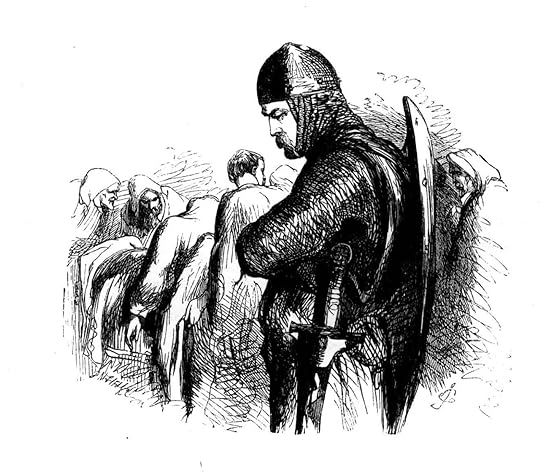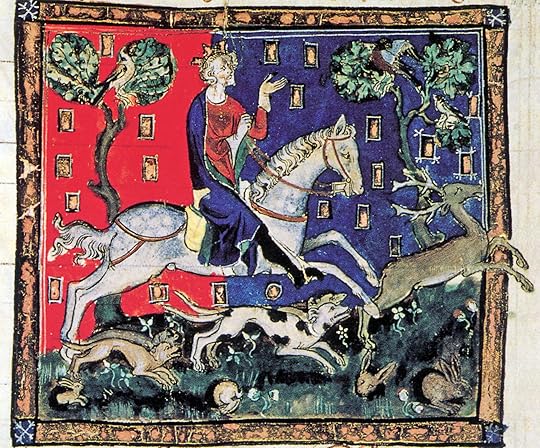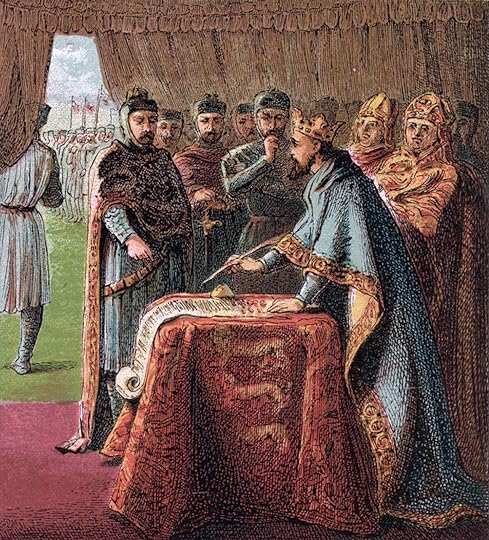What do you think?
Rate this book


352 pages, Mass Market Paperback
First published January 1, 1595
ARTHUR:
Will you put out mine eyes?
These eyes that never did nor never shall
So much as frown on you.
HUBERT:
I have sworn to do it;
And with hot irons must I burn them out.
ARTHUR:
Ah, none but in this iron age would do it!
The iron of itself, though heat red-hot,
Approaching near these eyes, would drink my tears
And quench his fiery indignation
Even in the matter of mine innocence;
Nay, after that, consume away in rust
But for containing fire to harm mine eye.
Are you more stubborn-hard than hammer'd iron?
An if an angel should have come to me
And told me Hubert should put out mine eyes,
I would not have believed him . . .
The only fine thing about this drama is "The Bastard" Richard Faulconbridge--illegitimate son of Coer-De-Lion--a dynamic, totally individualized character who speaks in his own unique voice and who seems to have wandered into "King John" from a later, better play.
KING PHILIP [to John]Historically, Richard I’s will was undisputed in England, where John inherited his brother’s power virtually unchallenged, since Richard wanted John to succeed him.
But thou from loving England art so far
That thou hast under wrought his lawful king,
Cut off the sequence of posterity,
Outfaced infant state, and done a rape
Upon the maiden virtue of the crown.
O, let us pay the time but needful woe,But let’s get back to our King. He’s pathetic, fallible, uncertain and truly an imperfect monarch. He is successful at first (mainly in Act 1 and 2) withstanding the French and the Pope but as the play moves along, he becomes subject to corruption, ill-judgement and, ultimately, collapsing fully and giving his power away. It’s a pathetic sight to behold.
Since it hath been beforehand with our griefs.
This England never did, nor never shall,
Lie at the proud foot of a conqueror,
But when it first did help to wound itself.
Now these her princes are come home again,
Come the three corners of the world in arms,
And we shall shock them. Nought shall make us rue,
If England to itself do rest but true.
He leaps downGood riddance, that’s all I have to say on that.
O me! My uncle’s spirit is in these stones!
Heaven take my soul, and England keep my bones!
He dies



And oftentimes excusing of a fault
Doth make the fault the worse by the excuse
Grief fills the room up of my absent child
Lies in his bed, walks up and down with me,
Puts on his pretty looks, repeats his words,
Remembers me of his gracious parts,
Stuffs out his vacant garments with his form
"That smooth-fac'd gentleman, tickling commodity,--Commodity, the bias of the world; The world, who of itself is peised well, Made to run even upon even ground, Till this advantage, this vile-drawing bias, This sway of motion, this commodity, Makes it take head from all indifferency, From all direction, purpose, course, intent: And this same bias, this commodity, This bawd, this broker, this all-changing word, Clapp'd on the outward eye of fickle France, Hath drawn him from his own determin'd aid, From a resolv'd and honourable war, To a most base and vile-concluded peace."
"Well, whiles I am a beggar, I will rail, And say, There is no sin but to be rich; And being rich my virtue then shall be, To say, There is no vice but beggary: Since kings break faith upon commodity, Gain, be my lord!--for I will worship thee."
